Introduction and Quick Summary
Grilled Eggplant with Balsamic Glaze is a delicious and versatile dish that brings a burst of flavor to your table. This simple yet sophisticated recipe combines the smoky taste of grilled eggplant with the tangy sweetness of balsamic glaze. Perfect for summer barbecues or as a side dish for any meal, this delightful dish is both visually appealing and satisfying to eat. Whether you are a seasoned cook or just venturing into the world of grilling, this recipe will guide you step-by-step in creating an unforgettable culinary experience.
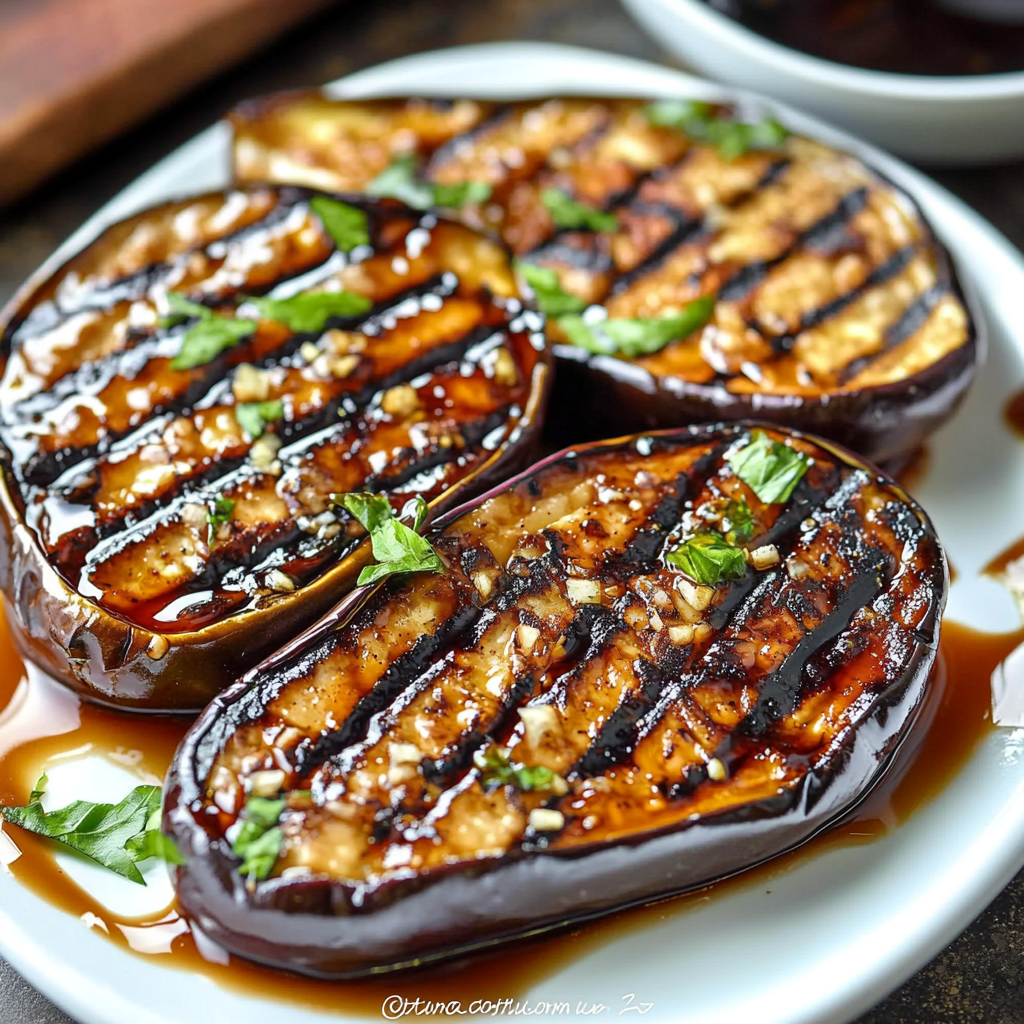
The preparation requires only a handful of ingredients, making it accessible for anyone looking to incorporate more vegetables into their diet. Not only does grilled eggplant provide essential nutrients and antioxidants, but it also boasts a rich texture that complements various cuisines. In this article, we will take you through the main ingredients needed for this mouthwatering dish, detailed instructions on how to prepare it perfectly, and tips on serving and storing your creation.
With its vibrant colors and enticing aroma, Grilled Eggplant with Balsamic Glaze is sure to impress your family and friends at your next gathering. So fire up that grill and let’s get started on making this delectable dish that will have everyone coming back for seconds!
Main Ingredients
Eggplants
Eggplants serve as the star ingredient in this recipe. For optimal flavor and texture, choose medium-sized globe or Italian eggplants. They should be firm to the touch without any soft spots or blemishes. You will need about two large eggplants for this recipe. When sliced into thick rounds (about 1-inch), they become perfect candidates for grilling. The grilling process enhances their natural flavors while giving them a lovely smokiness.
Olive Oil
High-quality extra virgin olive oil is essential in ensuring your grilled eggplants are moist and flavorful. You will need around four tablespoons of olive oil to coat the slices evenly before grilling. The oil not only adds richness but also aids in cooking by preventing sticking on the grill grates while enhancing the overall taste of the dish.
Balsamic Vinegar
Balsamic vinegar provides the tangy sweetness that elevates the dish beautifully. For this recipe, you will require about half a cup of balsamic vinegar to create the glaze. As it reduces during cooking, it thickens into a syrupy consistency that clings beautifully to the grilled eggplants while imparting rich flavors.
Garlic Cloves
Garlic adds depth and aroma to your Grilled Eggplant with Balsamic Glaze. You will need two cloves of fresh garlic—minced or finely chopped—to enhance the marinade’s flavor profile. Its pungency pairs wonderfully with both the earthiness of the eggplants and the sweet acidity of balsamic vinegar.
Fresh Herbs
Fresh herbs such as basil or parsley brighten up this dish beautifully. You can use about a quarter cup of freshly chopped herbs as garnish before serving; these not only add color but also bring freshness that balances out the richness from olive oil and balsamic glaze.
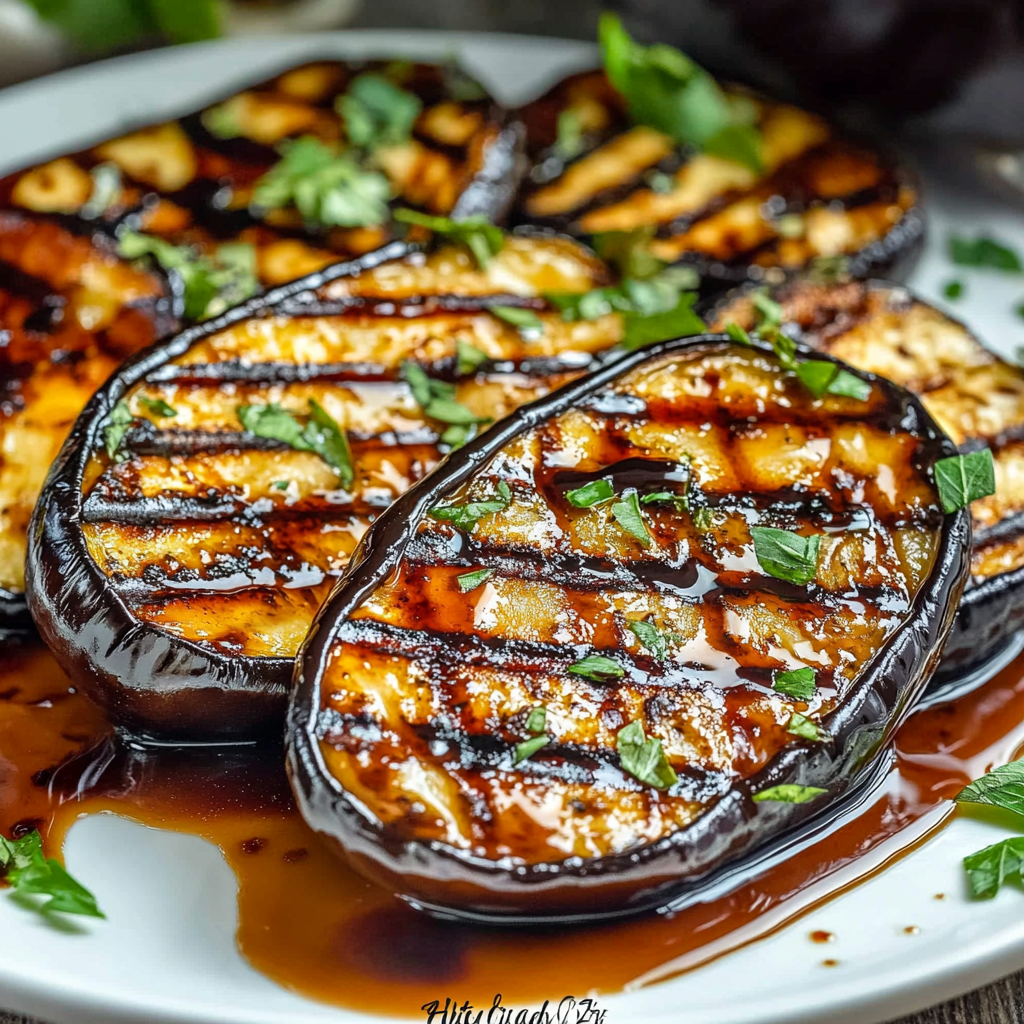
How to Prepare Grilled Eggplant with Balsamic Glaze
Step 1: Preparing the Marinade
To start off, whisk together four tablespoons of extra virgin olive oil, half a cup of balsamic vinegar, and two minced garlic cloves in a bowl until well combined. This mixture serves as both marinade and glaze for your grilled eggplants. Allowing these ingredients to meld together enhances their flavors significantly; thus letting them sit for at least 10 minutes is crucial before application.
Once ready, place your sliced eggplants in a shallow dish or resealable plastic bag. Pour half of the prepared marinade over them—ensuring each slice gets evenly coated—and let them marinate for 30 minutes at room temperature or longer if possible (up to two hours) in the refrigerator for deeper flavor absorption.
Step 2: Preheating Your Grill
While your eggplants are soaking up those delicious flavors from the marinade, it’s time to preheat your grill. If using a charcoal grill, light up your coals until they are covered in white ash; then spread them evenly across one side of the grill grate for direct heat cooking.
If you’re using gas instead, simply turn on all burners to high heat until they reach around 400°F (204°C). Preheating ensures that when you place those marinated slices onto it later on gives them beautiful grill marks while achieving that sought-after smoky flavor without overcooking or drying them out.
Step 3: Grilling Eggplants
After preheating has completed its course comes one of my favorite parts—the actual grilling! Using tongs carefully place each marinated slice onto direct heat over your grill grates; make sure they aren’t overcrowded—allowing air circulation retains their juiciness.
Grill each side for about 4-5 minutes until you see nice char marks appearing along with slight softness forming within each piece—this indicates they’re cooked through without turning mushy! Once done remove all slices from heat onto a platter where they shall rest briefly while we finish preparing our glaze.
Step 4: Reducing Balsamic Glaze
Now let’s focus back on our remaining marinade left aside earlier! Pour it into a small saucepan over medium heat allowing it gradually come up towards simmering point—stirring occasionally assists in preventing burning at bottom edges.
Let it simmer gently until reduced by half—this should take around 8-10 minutes—resulting in thickened syrup-like consistency resembling glorious glaze suitable enough coating our grilled beauties! Afterward drizzle generously over top finished plates showcasing those enticing slices before serving!
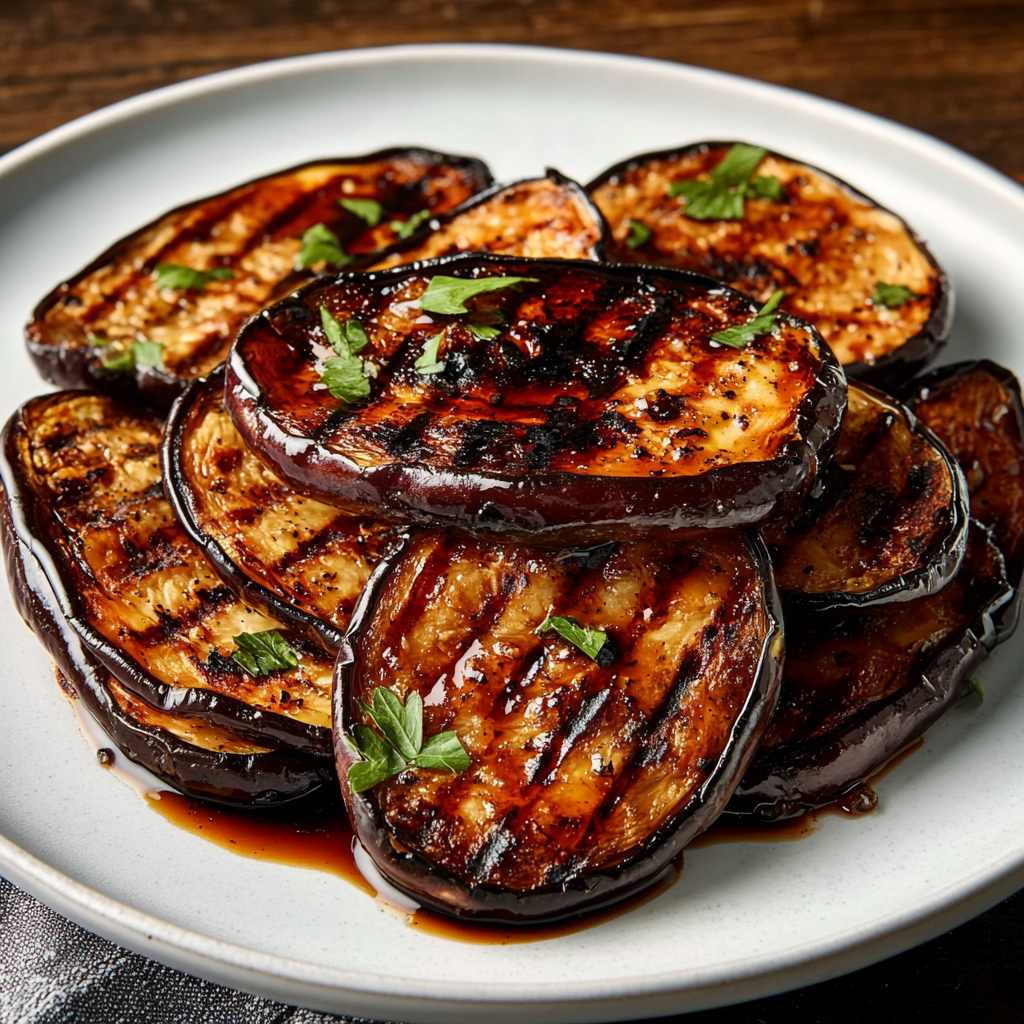
Serving and Storing Tips
Serving Suggestions
When it comes time to serve your incredible Grilled Eggplant with Balsamic Glaze consider pairing these flavorful bites alongside complementary dishes like quinoa salad or simple grain bowls topped off with feta cheese crumbles! Additionally elevating presentation further could involve garnishing fresh herbs atop along generous sprinkle sea salt brings out even deeper tastes found within every bite!
For larger gatherings consider offering variety by incorporating other grilled vegetables such as zucchini or bell peppers providing guests options while still maintaining healthy choices throughout meal times—the better variety often leads toward happier diners!
Storage Guidelines
Once you’ve enjoyed your delicious creation don’t forget about proper storage methods if there are leftovers! Store any uneaten portions within airtight containers placed inside fridge where they’ll remain good up until three days maximum timeframe before losing quality drastically due moisture exposure over time!
If desired freeze portions instead using freezer-safe bags ensuring excess air has been removed properly prior sealing shut bringing convenience future-ready meals right away whenever needed post-preparation day excitement wears off! To reheat simply oven bake again at low temperatures allowing even reheating without compromising original flavors enjoyed freshly made first time around!
By following these guidelines closely you’ll ensure nothing goes wasted while maximizing enjoyment experienced from every amazing slice created featuring irresistible combination known widely today as ‘Grilled Eggplant with Balsamic Glaze!’
Mistakes to avoid
One common mistake when preparing grilled eggplant with balsamic glaze is not salting the eggplant properly. Salting helps draw out excess moisture, which prevents the eggplant from becoming soggy during grilling. If you skip this step, you may end up with a watery dish that lacks the desired texture. To salt the eggplant, slice it and sprinkle a generous amount of salt on each piece. Let it sit for about 30 minutes before rinsing and patting it dry. This simple step can significantly enhance the final outcome.
Another mistake is choosing low-quality balsamic vinegar. The flavor of the glaze relies heavily on the quality of the vinegar used. Opting for a cheap or overly sweet vinegar can compromise your dish’s taste. A high-quality balsamic vinegar will provide depth and richness, balancing beautifully with the grilled eggplant. Look for authentic balsamic vinegars that are aged and have a thicker consistency—they will elevate your grilled eggplant’s flavor profile.
Additionally, many people underestimate the importance of marinating the eggplant before grilling. While some might think that brushing on glaze just before grilling is sufficient, marinating allows flavors to penetrate deeply into the eggplant. Aim to marinate for at least an hour, if not overnight, in a mixture of balsamic vinegar, olive oil, garlic, and herbs. This ensures every bite is infused with deliciousness.
Lastly, overcooking or undercooking the eggplant is another pitfall to avoid. Eggplants should be tender but not mushy when done right. Keep an eye on them while grilling; typically, they need about 5-7 minutes per side over medium heat. Using a grill basket can help if you’re worried about pieces falling through the grates.
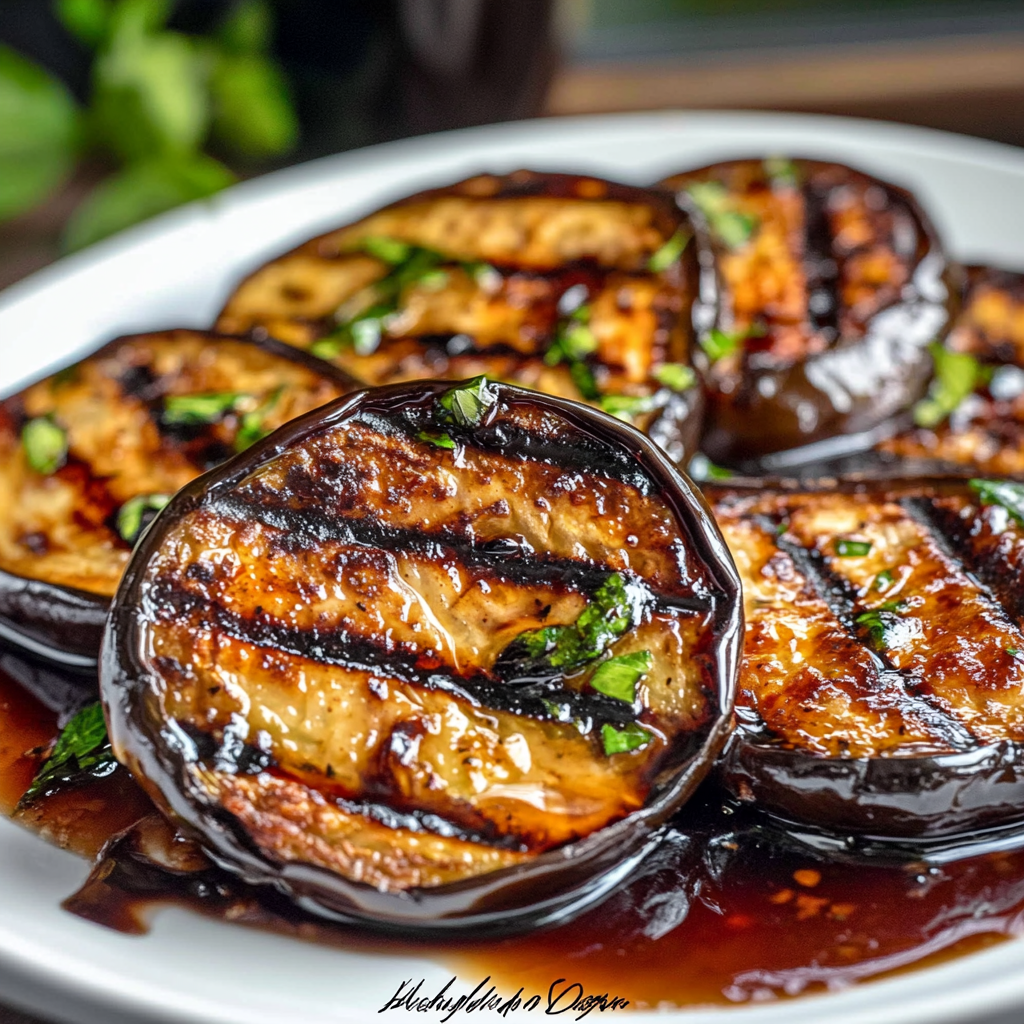
Tips and tricks
To achieve perfect grilled eggplants with balsamic glaze, start by selecting high-quality ingredients. Choose firm and unblemished eggplants for optimal results. Smaller varieties tend to be less bitter than larger ones, making them ideal for grilling. Always look for vibrant colors and smooth skin; this indicates freshness.
When preparing your balsamic glaze, consider reducing it for an intensified flavor. By simmering balsamic vinegar in a saucepan until it thickens slightly, you create a rich syrup that clings beautifully to grilled vegetables. The reduction process concentrates its sweetness and acidity, enhancing your dish without overpowering other flavors.
Utilizing proper grilling techniques can also make all the difference in achieving great results. Preheat your grill for at least 10-15 minutes before placing the eggplants on it to ensure even cooking and prevent sticking. Oil both your grill grates and the eggplant slices lightly before cooking to promote a nice char while keeping them moist.
Additionally, feel free to experiment with spices or herbs during marination or glazing phases. Adding fresh basil or oregano can introduce delightful herbal notes that complement the sweetness of balsamic glaze excellently.
Finally, don’t forget about presentation! Grilled eggplants can be served beautifully by stacking them on a plate and drizzling extra balsamic glaze on top before garnishing with fresh herbs or crumbled cheese like feta or goat cheese. This not only enhances visual appeal but also adds layers of flavor.
Suggestions for Grilled Eggplant with Balsamic Glaze
When serving grilled eggplant with balsamic glaze, consider pairing it with complementary dishes that balance flavors and textures well. A refreshing quinoa salad made with cucumbers and tomatoes would pair nicely alongside this dish; its lightness contrasts perfectly with the richness of glazed eggplants.
For those who enjoy protein-rich meals, serving grilled chicken or shrimp alongside your grilled vegetables can create a well-rounded plate. The smoky char from both proteins complements the subtle sweetness of balsamic-glazed eggplants beautifully.
Consider adding crusty artisan bread as well; this allows diners to soak up any remaining glaze on their plates while providing satisfying crunchiness against tender vegetables.
If you’re hosting a gathering or barbecue event, presenting grilled eggplants as part of an antipasto platter can be an excellent way to showcase them alongside cured meats, olives, cheeses, and assorted dips such as hummus or tzatziki sauce—perfect finger foods!
In terms of storage after cooking leftovers: keep any uneaten portions in airtight containers in your refrigerator for up to three days at most! Reheat gently before serving again; however note that reheated grilled veggies may lose some original texture quality.
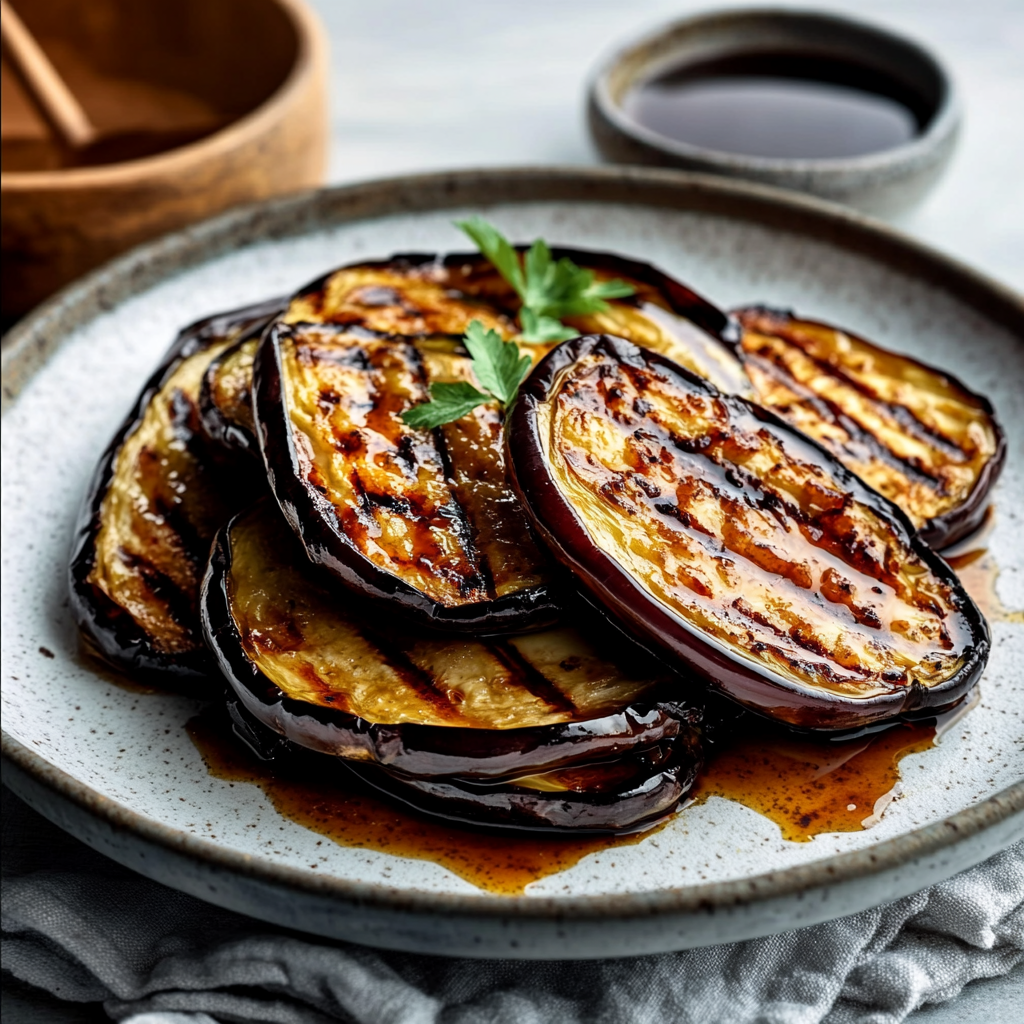
FAQs
What is the best way to grill eggplant?
Grilling eggplant requires some preparation for optimal results. Start by slicing evenly so they cook uniformly; aim for around half-inch thick slices to promote even charring without compromising tenderness inside! Salting beforehand removes excess moisture while reducing bitterness—this crucial step cannot be skipped! Preheat your grill adequately then place oiled slices directly onto heated grates ensuring safe distance between each piece allowing airflow around them resulting in better cooking performance overall!
Can I use other types of vinegar instead of balsamic?
While traditional recipes call specifically for balsamic vinegar due its unique sweet-tart flavor profile enhancing dishes effectively—feel free experimenting! Red wine vinegar offers similar tanginess though lacks inherent sweetness present within true balasmicos; apple cider vinegars add fruity notes too but adjust ratios accordingly since these alternatives might alter final taste dynamics significantly depending upon usage levels involved so always proceed cautiously when substituting!
How long should I marinate my eggplant?
Marination time plays an important role when preparing grilled dishes especially regarding flavor absorption! For best outcomes consider letting sliced pieces soak into marinade mix ideally between one hour minimum up until overnight maximum duration depending upon personal preference regarding intensity desired here—longer times yield richer tastes though don’t exceed beyond twenty-four hours since too much soaking could lead towards overly softening leading towards undesirable textures upon cooking causing less enjoyable eating experiences later!
Can I grill whole eggplants instead of slices?
Absolutely! Whole grilling has its benefits but requires more careful attention throughout cooking process compared slicing methods! Ensure outer skin gets pierced multiple times using fork prior placement onto preheated grate otherwise pressure buildup may result leading towards potential unwanted explosions whilst sizzling away resulting messes around area where food being prepared remains located making cleanup afterward tedious affair altogether!
Is it necessary to peel the skin off?
Peeling isn’t strictly necessary unless overwhelming bitterness is detected from specific variety being utilized—certain older larger breeds sometimes produce harsher flavors due natural compounds found within skins themselves! For most modern varieties purchased regularly today though leaving skins intact provides added nutrients along with additional textural contrasts creating visually appealing presentations overall—however if desired simply remove portions beforehand prepping according individual tastes/preferences accordingly while respecting traditions behind recipes themselves!
What sides pair well with grilled eggplants?
Grilled vegetable preparations often benefit from light summery accompaniments like fresh salads featuring citrus vinaigrettes offering brightness cutting through heavier elements presented throughout main courses served alike! Additionally roasted potatoes seasoned herby blends create satisfying compliments alongside creamy dips like tzatziki pairing excellently creating rounded flavor profiles showcasing versatility within Mediterranean cuisine overall reflecting healthy choices enjoyed widely across various culinary cultures alike enhancing nutritious value derived from wholesome ingredients utilized effectively therein!
Conclusion
Mastering grilled eggplant with balsamic glaze requires key techniques to ensure a perfect dish. The first step is salting the eggplant to remove excess moisture, which helps maintain its firmness during grilling. This technique enhances the texture and prevents the eggplant from becoming soggy. By focusing on these steps, the final dish will have a rich, flavorful profile that elevates the overall dining experience. When prepared correctly, grilled eggplant with balsamic glaze becomes a crowd-pleasing dish, adding diversity and vibrancy to any meal. It’s a celebration of culinary craftsmanship, offering a perfect balance of flavors. The process of cooking and sharing such meals brings joy and unity to gatherings, whether with family or friends, and creates lasting memories. Every bite not only satisfies the palate but also deepens connections, reinforcing the value of shared experiences around the table and celebrating life’s simple yet meaningful moments.
